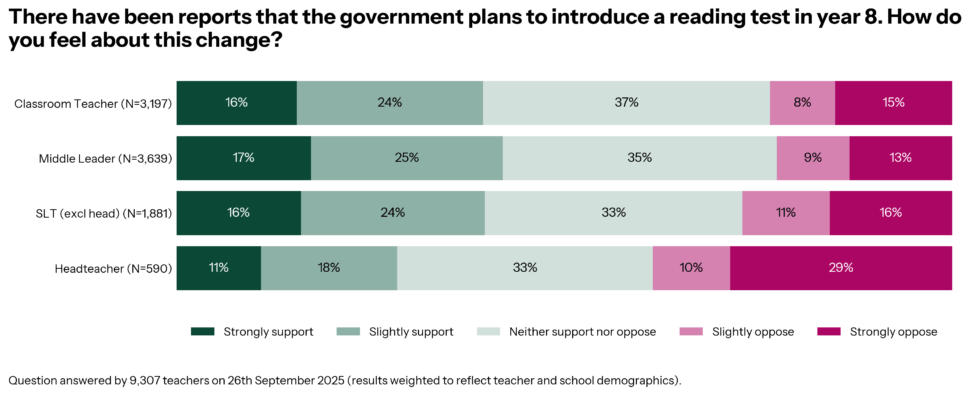Much more educators back government prepare for a required reading examination in year 8 than oppose it– but leaders are much more sceptical, new ballot programs.
It would be the first legal examination in key phase 3 given that SATs for year 9 s were junked in 2008
The plan has actually been motivated by worries that poor analysis is holding students back from accessing the educational program in other topics at high school.
A Teacher Tapp poll has actually discovered 16 percent would “strongly assistance” the introduction of such an examination, with a further 24 percent “slightly” sustaining the plan.
Thirty-six percent claimed they neither sustained nor opposed it. Nine per cent somewhat opposed it, while 15 percent were strongly opposed.
Under the strategies, the examination results would be offered to the government and Ofsted, yet would only be released at a national level– comparable to the year 1 phonics check.
They would not be made use of to set off intervention in schools, resources claimed.
Phillipson protects strategies
Yet Instructor Tapp discovered headteachers were more likely to oppose a year 8 reading test (39 per cent) than other senior leaders (27 per cent), middle leaders (22 per cent) and class educators (23 percent).

The pollster stated this revealed “worries that a brand-new examination would certainly be used as a school liability measure”, something unions have actually likewise elevated.
But speaking at the Labour Celebration seminar at the weekend, Bridget Phillipson, the education secretary, protected the proposition.
“It is important, especially for working-class kids, that we have a sense not just of where they are however where we require to action in and put even more assistance in position …”
“Obviously, I want to make sure that our personnel are well supported, yet my leading priority is making sure that all children leave institution well prepared for the world to come.”
Responses from college leaders have actually been mixed. The ASCL leaders’ union has actually said if “done well”, the examination “can be practical”, but alerted institution leaders “might well be uneasy about what future federal governments might do”.
The NAHT union, on the various other hand, has claimed the examination would be “unnecessary, disruptive and not a great use money”.
‘We didn’t show them to check out. That’s on all of us’
Dan Morrow, the president of the Cornwall Education Learning Depend on, told the Labour seminar he was “in favour” of the examinations.
“A lot of our youngsters are resting analysis tests, left, right and centre, and we’re paying a lot of money for them.
“My stress over the check is that we respond properly, as in some cases we do, which is we show to an examination … That gets on us, frankly, because that’s not what the check is.
“As a main leader, I would claim this really honestly, occasionally we nurture and hold our key children so well, then we state, ‘oh, however what takes place when we get to second?’

“What occurs is we really did not teach them to read, and so they can not really access that curriculum. And that’s most likely not the second leaders. That gets on everyone.”
Annamarie Hassall, the chief executive of the National Organization for Unique Educational Requirements, told the exact same panel occasion at the conference that the idea of year 8 checks had actually shown up in her discussions with the federal government’s curriculum and assessment evaluation.
“We did talk about measurements, and one of our suggested dimensions was reading. We have a worry that often there’s a sight that analysis is the work of key phase, and in second that work should have been done elsewhere.”
Different methods to progress testing
Instructor Tapp’s ballot reveals schools take different techniques to inner screening throughout crucial stages 2 and 3
Asked just how they presently assessed whether students in their subject got on track at the end of vital stage 3, 59 per cent stated they utilized end of topic examinations they composed themselves, while 37 percent claimed they rely upon instructors’ judgment.
Just 11 per cent stated they got in examinations.
However asked for the primary method they used to inspect analysis development during key phase 2, 43 per cent stated they made use of standard examinations from external suppliers, while 27 per cent claimed they utilized past SATs papers and 24 percent said their college provided its very own tests.